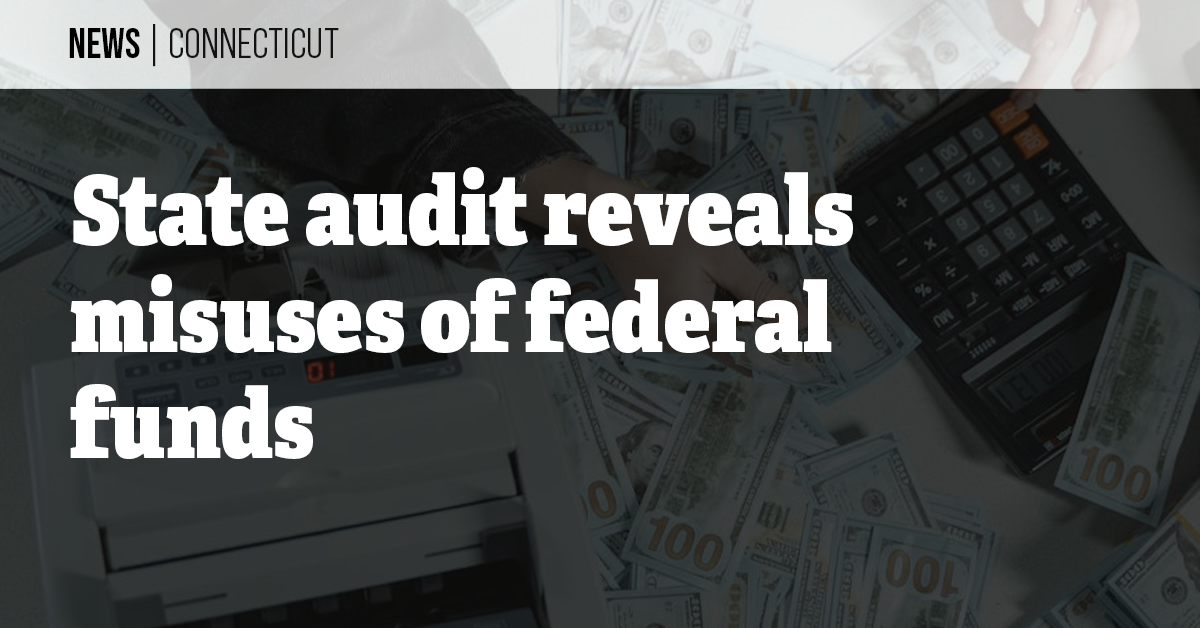Fourteen Connecticut agencies failed to meet the requirements of federal funding during the last fiscal year according to a recent report from the state’s Auditors of Public Accounts.
Auditors recently completed the Statewide Single Audit Report for the fiscal year ending June 30, 2023, and uncovered 50 different findings related to 21 federal programs at 14 state agencies. Of those findings, 29 were repeats from previous years.
Several of the findings revealed state agencies improperly claimed or used federal funding while others found a lack of oversight or improper use of federal funds.
The audit is a condition of federal funding. Guidelines for which programs to audit come from the federal Office of Management and Budget.
The audit found that both the Department of Public Health (DPH) and the Department of Mental Health and Addiction Services (DMHAS) did not meet maintenance of effort requirements for federal funds. Maintenance of effort requirements are a stipulation of federal funding. They require a grant recipient to maintain a certain level of state funding in order to be eligible to receive full federal funding.
In DPH’s case, the audit revealed that the agency did not meet the maintenance effort requirements for HIV Care Formula Grants in fiscal years 2021 and 2022. The agency fell short by $12.9 million in 2021 and $4.1 million in 2022.
DMHAS failed to meet the maintenance of effort requirement for the Block Grants for Prevention and Treatment of Substance Abuse in 2023, falling short by $4.2 million. It is not the first time an audit has found DMHAS insufficient in this area.
Failure to comply with the requirement means the state could lose federal funds when grants are allocated in the future. The audit recommends the agency strengthen internal controls to ensure they are complying with the requirements.
The audit also found that the Department of Children and Families (DCF) claimed federal reimbursement for a child who was deemed ineligible for the Foster Care Program by the department. In total, DCF claimed $1,401,506 during the audit period in payments for children who were ultimately ineligible. The audit recommended that DCF return the expenditures and strengthen internal controls to ensure it doesn’t happen again.
DCF wasn’t the only state agency that improperly used federal funding, according to the audit. The Connecticut Technical Education and Career System (CTECS) improperly used federal funding in fiscal year 2022, overspending by $328,335 in one instance and spending $206 on an ineligible school in another. In both cases, the funding allocation did not match an application CTECS submitted to the federal government. This same finding has occurred in six prior audits.
Another finding from the audit showed that background checks for unlicensed relative providers in the Care 4 Kids programed, overseen by the Connecticut Office of Early Childhood Education, were expired or lacked evidence. The audit also found that the Department of Social Services (DSS) did not promptly suspend ten providers during fraud investigations, resulting in $228,158 in payments to providers that should have been suspended.
In addition, the audit found that DSS did not sufficiently review Income and Eligibility Verification System alerts for the date of death for clients involved in Medicaid and SNAP programs. This resulted in the department failing to record the date of death in 11 cases, a failure to close 8 cases, and $8,746 in overpayments that the department did not recover in 13 cases.
Additionally, the audit found unauthorized individuals used $5,132 in deceased clients’ SNAP benefits in five single-member households after the client had passed away. This finding has appeared in 27 previous audits.
According to the 2023 audit, Connecticut expended $14.5 billion in federal funding in fiscal year 2023, with roughly $3 billion coming from federal pandemic aid. By far the biggest in-state federal program is Medicaid, which expended $6.9 billion in fiscal year 2023. Funds associated with the Supplemental Nutrition Assistance Program (SNAP) were the second biggest source of federal funds, totaling $1.2 billion.







